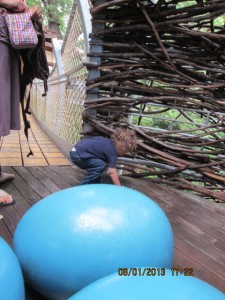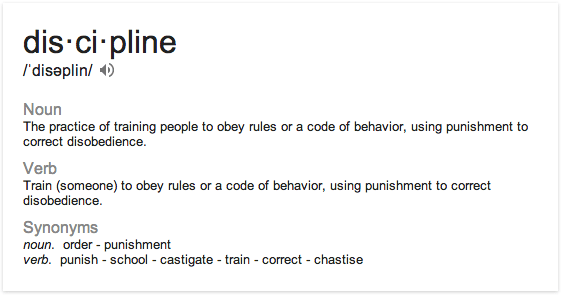The Consequences of Discipline
“Good Job!” And Other Things You Shouldn’t Say or Do has me thinking on something that keeps coming up for me lately.
Here’s what I read on my A Living Family Facebook page feed:
“Give Grandma a hug!” “Where’s my kiss good-bye?” “Don’t you love me anymore?” When we insist or guilt our children into showing affection, we may think we’re teaching them: “Think of others. Being polite and loving is important.” We probably don’t realize that what they’re internalizing is likely something closer to:
1) My feelings are inconvenient and disruptive. I better keep them to myself.
2) The feelings of grown ups are more important than mine.
3) Affection need not be genuine. (Mom and Dad said so!)
4) Feigning love, joy and excitement is expected and important.
5) There is only one proper way to respond when someone wants to be affectionate with me: reciprocate. Otherwise, I’m rude and selfish. (Am I really rude and selfish? I don’t feel that way.)
6) Don’t listen to my body, it will get me in trouble. Listen to grown ups.
7) My body is not my own.
I’m only worthy of love when I do what my parents want me to.
No? What will life be like for a child walking around with a brain wired with these messages?
This “my body is my own” piece is deeeep for me and difficult at times as a result.
Having witnessed my own instincts plus my parents’ parenting of my children, I know it does not come naturally or instinctively for everyone in all situations. It seems to me that it takes a good deal of hard work to even stop and observe rather than react and get involveSome people think “peaceful parenting” is the easy way out. (Because they think it is permissive?) For me, I find it way harder to stop and respect children than to dominate and control them.
It’s easier to force, manipulate, bribe, cajole, threaten, coerce, pout, withdraw, reward, punish, spank, isolate, condescend, demean, demand, deny, and otherwise make a child do something or not doing something using the power we have as beings.
I can hold my 19 mo son and put his pants on. I can choose my daughter’s clothes for her instead of “letting her” wear striped tights and a tucked in tank top with no pants or skirt or short. I can make my kids do things by talking to them and treating them a certain way.
In fact, everything in my being was at odds and in major conflict in this moment:

These are the giant, steel eggs bolted in the “nest.” My 3.5 yo took this picture of her 19 mo brother.
Why? Why was I feeling anxious, scared, angry, ashamed, and sad when I believed I was being called into question as the worst mother ever?
Because my daughter was kicking giant, steel, bolted eggs with all her little might using her new super toe-protected shoes so that she could “make them move.” Even with her 30 lbs of force, these eggs, “left out” and meant for children in particular as is most of this area, moved maybe 1 cm in either direction. She would hurt her toes before any harm would come to the eggs….this work of art….
“HEY! You do that again and I will kick you in your butt!” says the grandmother who has just entered as her grandson goes to copy my daughter’s curiosity quest.
“I expect you to behave.”
My daughter stopped. She looked at the boy. She looked at the grandmother. She leaned on the egg. She went to kick it and changed to a half-hearted tap with more leaning.
I spent a good deal of time there after as the children played there and moved on to this net 50 feet up over the ground below.
I could have easily changed my approach to my daughter’s kicking (which resumed after these folks left). Instead, I used the opportunity to close my mouth and consider what I believe and what I wish for my child and our relationship. From that place, I chose to stay silent for some time until she began kicking. At which time I resumed our one-sided conversation:
(I observe again that they won’t move if she pushes them–only if she kicks.) “Are you wondering if you can move the eggs?
Does it feel good to use your shoes with that hard toe cover so you can kick hard and not get hurt?
[My 3.5 yo, had been silent up to this point.]
“Why did that lady say that to him?”
I am not sure, but I wonder if she was worried that the eggs would get hurt?
I did not feel clear and confident in my response, and I still felt shaken from processing the whole event — a grown human being threatened a five-year old with violence for doing something developmentally natural, especially considering he was seeing my daughter. I imagine she felt a bit helpless as to how to make him stop in the presence of such a strong influence to do something she did not want him to do. She knew, of course, that physical violence will generally stop a child from doing what they are doing. I think we also both know, if were to think it through fully, that our actions of that nature lead to children doing things in private and not “to our faces.”
1) My feelings are inconvenient and disruptive. I better keep them to myself.
2) The feelings of grown ups are more important than mine.
3) Affection need not be genuine. (Mom and Dad said so!)
4) Feigning love, joy and excitement is expected and important.
5) There is only one proper way to respond when someone wants to be affectionate with me: reciprocate. Otherwise, I’m rude and selfish. (Am I really rude and selfish? I don’t feel that way.)
6) Don’t listen to my body, it will get me in trouble. Listen to grown ups.
7) My body is not my own.
To me, the main issue with discipline and force in all its forms is the external locus of control. If we truly wish to nurture and instill the self-discipline we talk about in our children, we must show them by our own example and by nurturing an internal moral compass. Parenting is not the realm of control, just as birth is not a land of control. Life is fluid and precious and to be honored and respected.
If see the relevance of those 7 ideas a child might get from our forced affection:
- My feelings (thoughts, curiosities and interests) are inconvenient, disruptive (and bad and unacceptable). I better keep them to myself.
- The feelings (desires, fears, thoughts, beliefs, needs) of grown ups are more important than mine.
- Affection need not be genuine. (Nor feeling sorry, saying thank you, feeling compassion…)
- Feigning love, joy and excitement (when authorities are around) is expected and important. (faking it and going along with things as is necessary for me to do what I really want)
- There is only one proper way to respond when someone wants to be affectionate (get their way) with me. Reciprocate. (Do what they say.) Otherwise I’m rude and selfish.
- Don’t listen to my body: it will get me in trouble. Listen to grown ups. (Listening = doing what you’re told to do…. “how come no one ever listens to me?”)
- My body is not my own. (My body is not my own. Nor is my mind, my heart, my spirit….Oh wait, people tell me to “be myself…” But then they get upset when I do that…)
I wonder how much we know and are willing to explore how our choices, our messages our own beliefs involve force that leads to domination and violence.
I have been reading Amy Phoenix’s book (written write on her blog): Force Free Parenting.
Life easily becomes about getting big enough to get respect through force and fear, whether you use sugar or spice, words, bodies or weapons. Sometimes, even peaceful parents may have the words and lose the tone, have the tone and lose the feeling, have the feeling and lose the words. This is why I am working to stop and acknowledge first before doing anything. (And generally this involves listening in to myself first and then connecting with my kids from that place.)
What I am hoping to help my children live is an authentic life, led by a compassionate, courageous, competent and confident heart. This does not involve discipline, or even self-discipline by the definition of discipline given above and does involve a choice towards kindness and self-respect.
It is this self-respect that comes up and speaks to me. This is where my mind goes when I read the post from “Good Job!” And Other Things You Shouldn’t Say or Do on “my body is my own.” I find myself doubting and second guessing, stopping and examining my intentions and motivations: Is this action truly serving my actual intentions for my child and our relationship?
Often when I am going along like “normal,” and especially when I am out and about in society, I find myself saying “No” to my initial internal reaction and response.
The kind of world we talk about, with peace and love and harmony, is not created with words and actions of force, violence and domination over. It is created with conscious and compassionate choice. It is created in the conversations we have with our children, our partners, our family and friends, and ourselves. As we model a connected, compassionate way with our children they will internalize this new way and push the ripples out further.
This is the work we are doing.
This is hard, subtle, detailed and deliberate work we are doing.
It is not easy. It is worth the effort, to sprout peace, one heart at a time.
*****
RESOURCES
- No Spanking, Yelling, Time Outs…What Else Is There?
- Tips for Peacefully Parenting a Whining Child
- How Can I Get My Kid to Do What I Say?
- Setting Limits with Respect and Compassion
- 3 Dangerous Parenting Myths
- Self Talk: A Tool for Tough Parenting Moments
- How Do You Get Your Child to Cooperate?
- Online Series for Communication in Relationships and Parenting
- Amy Phoenix and Force Free Parenint
-
[…] The Consequences of Discipline […]
Leave a Comment



I am a divided mother when I read this. On one hand, I feel some of what you are feeling, and agree with so so much of it. On the other hand, handling the big feelings (mine and theirs) sometimes, is a challenge. I have, as my oldest is about to turn seven, and my youngest will be three in December, just now quit yelling. Spanking? That’s been on its’ way out for a long time, gradually getting less and less as I see less and less value in it.
However, I do beleive that yelling and spanking aside, that I will definately feel the need to enforce some rules once in a while. Standing and observing isnt always the answer, and reading this sort of article makes me feel nervous…still growing, I guess.
I will say that for someone who grew up in a ‘spanking’ household, I do not do much of it. I do not yell, either, anymore. SO, that leaves timeouts, removal, redirection, requesting, and other things.
When your child is blatantly violent or mean with other children, or you, how do you handle this?